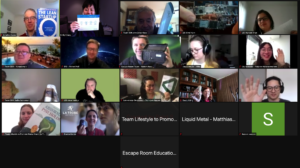
The shift to largely-online training offered some advantages in 2020, along with opportunities to fine-tune our own training offerings!
FLEET ensures that our young researchers are prepared for future success – wherever their career takes them.
The Centre currently supports 64 higher degree by research (HDR) students and 45 postdoctoral researchers with another 21 research affiliates working on FLEET projects and invited to Centre training, workshops and events.
FLEET connects its researchers with internal and international networks, for example, offering research internship programs at partner organisations.
We are fortunate that FLEET early-career researchers (ECRs) have welcomed leadership roles within the Centre, including:
- Initiating ‘remote’ outreach projects
- Seeking out and coordinating development training for ECRs and students
- Running internal leadership and skills training (Women and Leadership Australia (WLA), Blender animation software, Illustrator graphics package)
- Chairing Centre governance committees.
FLEET training programs in 2020
The shift to largely-online training offered some advantages in 2020, along with opportunities to fine-tune our own training offerings by watching experts at work!
- Blender science-animation training, run by Research Fellow Dr Iolanda Di Bernardo
- Illustrator graphics training, run by Dr Dianne Ruka
- How to write a scientific paper, run by Chief Investigator Prof Nagy Valanoor
- Building leadership skills (WLA, Leading Edge)
- Got PhD what’s next – graduating in a pandemic, in partnership with FLEET partner, the MacDiarmid Institute
- Ascend research impact and industry engagement
- Effective presentations and (equity-themed) Wikipedia-editing skills, with the ARC Centre for Engineered Quantum Systems (EQUS)
- Annual workshop tutorials/colloquia (graphene, research translation, quantum-based metrics, artificial intelligence (AI) and data science for social good, exciton-polaritons, equity modelling).
In addition, FLEET organised a number of training sessions around equity and diversity awareness and Centre members presented updates on their research in the series of monthly FLEET live-streamed seminars.
Members were also funded by FLEET to pursue their own, individual training needs, with the assistance of a small ECR-coordination team that sought out relevant opportunities. Individual training included grant writing, science communication, paper-writing and presentation skills, software (Excel, Premiere, Illustrator, Python), sign language, data science, LinkedIn and career skills.
—this is an extract from the 2020 FLEET annual report [read the full report online]

